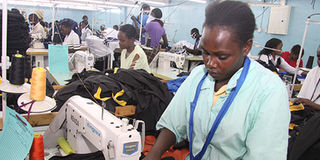EPZ firms want law barring increased sales eased

Textile workers at Ricardo EPZ Athi River. Photo/ANTHONY KAMAU
Firms established at the Export Processing Zones want the law restricting their local sales to 20 per cent enhanced to 70 per cent as competition in the international market gets tight.
They have petitioned the government to push for this amendment at the East African Community to allow the established firms, some of which are threatening to relocate, to have a new lifeline.
“The East Africa Community protocol slumped death on us out of misconception and it is important that these laws are reviewed to save the industries from closing down,” said the Export Processing Zone Authority acting chief executive officer Mr Joseph Kosure.
Speaking during a tour by Trade minister, Mr Chirau Ali Mwakwere at Athi River EPZA grounds, Mr Kosure also called for the removal of 2.5 per cent surcharge on the sales from EPZ that are sold in the local market.
He said this disadvantaged Kenya products since the same tax was not levied on imports from East African countries.
“If we fail to address these issues the factories will relocate and still offload their products here from the neighbouring countries,” he said.
He said several firms had indicated that they would relocate after the expiry of their contract period, threatening to increase the levels of unemployment in the country.
EPZs were established in 1990s with the purpose increasing exports riding on the African Growth and Opportunities Act, an initiative of former American president Bill Clinton of assisting developing countries increase trade with the United States.
The products exported to the country enjoy tax free access to the market.
Mr Kosure said the zone generated Sh23 billion from the exports in 2009, which was a decline from Sh28 billion in 2008.
EPZ firms currently employ 30,115 workers.
He said after existing for twenty years, it was important to change the laws governing the EPZ to reflect the situation today.
The government plans to convert EPZs into special economic zones and a draft Bill is awaiting Cabinet approval, which will then be followed by debate in parliament.
Mr Mwakwere said three special economic zones had been identified for initial development which include the Northern corridor, Nairobi-Mombasa road and Kisumu.




